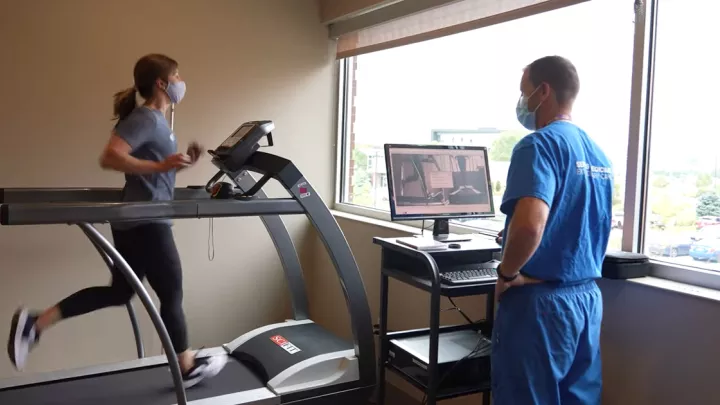How to train for your first marathon

Running is one of the most democratic sports in the world: all you need to participate is a pair of shoes. That’s why approximately 1.1 million people run a marathon yearly, with another 2.1 million running a half-marathon. Still, whether you’re a first-time runner or someone returning to the sport, there is some information you should know before attempting to join the ranks of marathon runners.
Where to begin training for a marathon
The first marathon training tip to know is to give yourself enough time. “Most injuries occur because people jump into a new activity too quickly and overload their tissues and structures, which then become painful or injured,” says physical therapist Jason Roberts, PT.
That’s why you must be careful how you introduce yourself to running. “Every step equates to about three to five times your body weight hitting the ground,” says Roberts. “And every mile, you’re taking 700 to 1,000 steps. Multiply that figure by 26 for a full marathon, and it’s a significant load your body’s taking.”
Because of this load, you must prepare not only your cardiovascular system to be ready for the race but also your musculoskeletal and neuromuscular systems. Slowly and methodically introducing yourself to running allows you to build up these systems. "Conversely, if you've never run and think you can run a marathon in a few months, your risk of injury is probably pretty high," says Roberts. "That doesn't mean it's going to happen, but it's an increased risk.”
Typically, you want to start with a running-to-walk ratio. For example, run for two minutes, then walk for two minutes as you introduce your body to the load you're attempting to reach. Then, you can gradually increase the running half of the ratio. "A month before your race, you should reach 80% of the race's volume," says Roberts. "So, if you're running a full marathon (26 miles), you want to ensure you can tolerate a 20-mile run.”
As you incrementally increase your volume, be careful to do so only by 10% to 30% weekly. Progressing more than 30% per week will significantly increase your injury risk. “If you ever develop pain (more than 3 out of 10) that doesn’t decrease within 24 hours after a run, pay attention to it,” says Roberts. “Still, there’s always some pain with adding some stress to your body, so don’t be afraid of a little pain.”
The final beginner training tip is limiting yourself to one long run a week. This one run should be around 50% of your total volume. So, if you’re running 20 miles a week, your longest run shouldn’t exceed 10 miles. Limiting your longest run helps reduce the risk of injury.
Weight training for running
In addition to these suggestions, Roberts also recommends runners lift weights one to two times a week or do some kind of resistance workout. For example, if you’re running on Monday, Wednesday and Friday, you should lift on Tuesday and Thursday.
While you should rest between runs, that doesn't mean you must rest from other activities. Walking, riding a bike, using a rowing machine, or lifting weights are all activities that help you build your cardiovascular endurance while giving your legs a break.
Note that endurance running doesn't require endurance lifting (lifting light weights for many reps). "You need to lift heavy," says Roberts. "As mentioned, when running, your legs take a heavy load. So, you must ensure your tendons and muscles can tolerate this load, meaning you should probably lift heavier than you realize.”
“Runners need to be strong,” says Roberts. “And you don’t have to worry about bulking up because your running will keep that in check. You don’t have to add mass to get stronger.”
Recovery from training for a marathon
The data says no single recovery modality is best. "Recovery is simple: get enough sleep, have a good nutrition plan, and stay hydrated," says Roberts. If you're eating poorly and only sleeping six hours a day, I wouldn't worry about other recovery methods like ice baths, compression garments or foam rolling." Sleep, nutrition, and hydration are the best foundations for ensuring the best recovery possible.
What to do on the day of your race?
You'll be behind the eight-ball if you wait until the night before your race to get hydrated. Still, be careful not to overhydrate. It won't be helpful if you guzzle water right before your race. "I usually tell people to drink 16 ounces of water before running," says Roberts. "That way, you have some hydration but won't need to go to the bathroom when the race starts."
Also, try to warm up as best you can. It can be difficult to do in a marathon because of the sheer number of runners, but do your best.
Common mistakes and misconceptions
One of the most common mistakes Roberts sees is people starting to train for running too quickly. If you change habits too fast, your body can't accommodate these changes, which usually induces pain. "When adding load to your body, you want to give it time to respond and adapt," says Roberts." Like when weightlifting, you should steadily but slowly add load to your running.”
For example, if you ran three times a week for two weeks and had no pain, you've probably given your body time to adapt to the new, increased load. Then, you can add more. Also, there's a difference between cardiovascular and musculoskeletal load.
“Your cardiovascular system will adapt faster than your legs (musculoskeletal system) will,” says Roberts. “So, if you feel like you’re not running hard enough for your cardio and add more load too quickly, you could risk an injury to your legs.”
The biggest misconception Roberts sees is that people believe running is bad for their knees. A couple of studies have shown that running is actually knee-sparing. "For most recreational runners, we see their knees are better because you have better weight control and increased tolerance to strenuous activities.”
Recovering at Nebraska Medicine
Running is an excellent activity for general health. So, those looking to begin running or who want to get back into it shouldn't be afraid of it. "If you want to run, go run," says Roberts.
Still, if you start running and experience an injury, Nebraska Medicine is here to help. The rehabilitation team has excellent occupational and physical therapists, including Roberts, who will assist you in recovering successfully.







